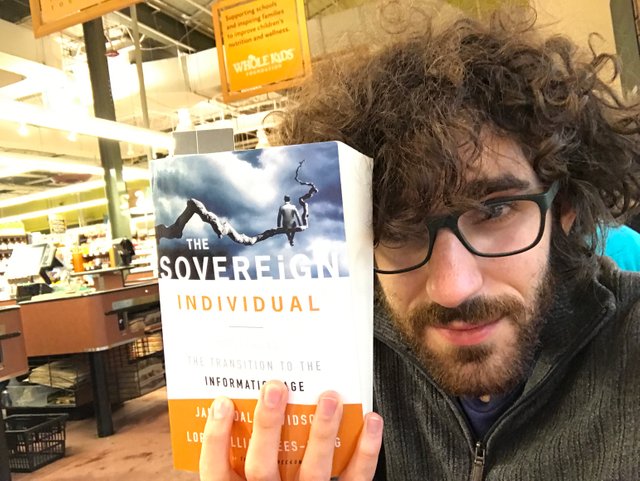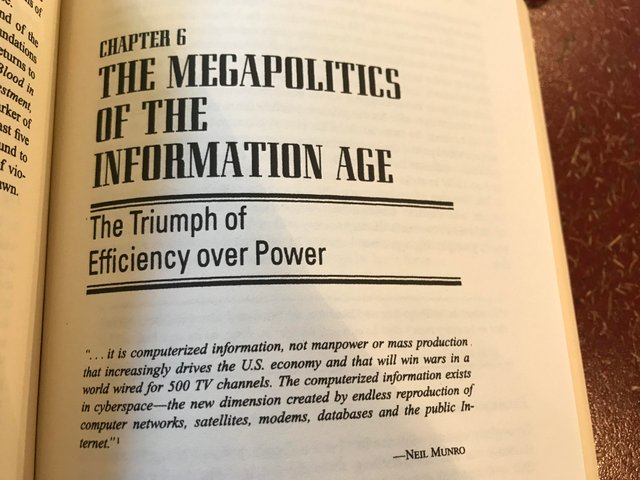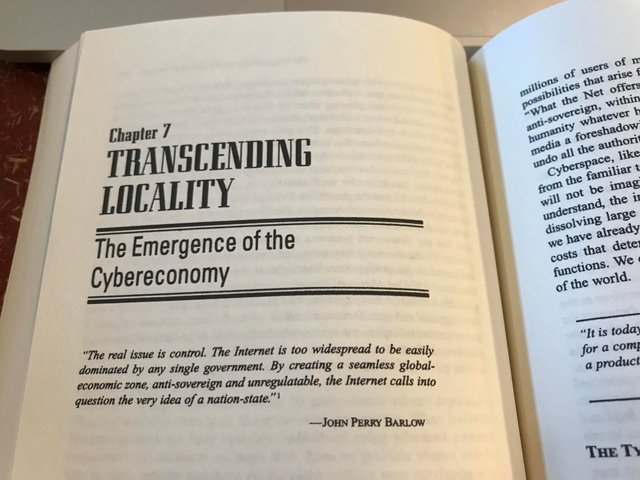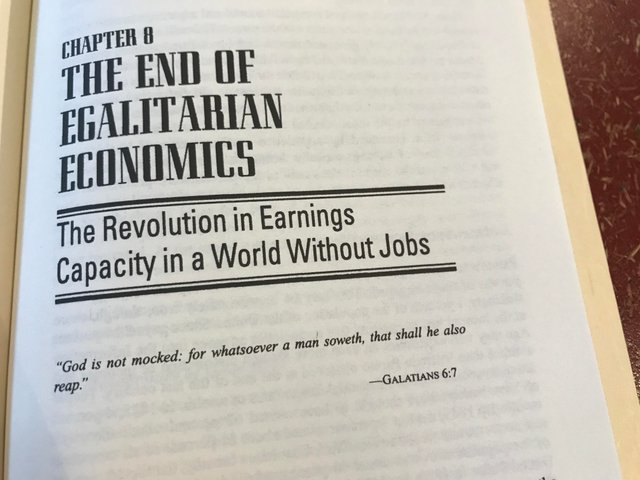Books for Better Creativity 02, Part 4: Lessons & Insights from "The Sovereign Individual” Ch. 6, 7, & 8
In a world of increased individual sovereignty, how can you thrive via creative work? This book offers some important clues.

Artists today are living the lifestyle that everybody will live in the future. We already understand what it is like to earn income from a variety of sources, rather than relying on one job.
If this book is right, other occupations will shift towards independence as large corporations lose value in favor of small, nimble businesses. We’ve seen the beginnings of this trend in the last two decades… will it continue?
Editor’s Note
Like I said in the last post: The views represented in the book do not necessarily reflect my own.
This is a way to learn from the perspectives of others, which happens best when we challenge our own beliefs. I present this information in as politically neutral a way as I can.
In these posts, “Quotes” are direct quotes, “Notes” are notes from the book’s ideas, and “Personal Thoughts” are my own ideas.
Chapter 6: The Megapolitics of the Information Age - The Triumph of Efficiency Over Power

Quote: “A Government’s capacity to tax ultimately depends upon the same vulnerabilities as do private shakedowns and extortion.” — in other words, taxation is theft.
Personal Thoughts: I can see the argument for “taxation is theft” (because it is done under the threat of violence) - and the argument against it (because we have never seen a functional modern society without taxes). Regardless of your view on tax - if the trends in this book are real, the government will have a harder and harder time extracting tax. Monero and ZCash are current examples of this.
Personal Thoughts: BTW - I strongly advise you to pay taxes on all your cryptocurrency if you live in America. It’s just so dangerous to commit tax fraud, regardless of your personal views, that self-preservation makes it wise to pay up.
Quote: “Powerful encryption algorithms… will allow the creation of a new, protected realm of cyber commerce in which the leverage of violence will be greatly reduced.”
Personal Thoughts: The above quote is happening.. and it’s called cryptocurrency! It’s easier to protect/hide $1,000,000 worth of bitcoin, than $1,000,000 in cash - and this greatly reduces the need for banks.
Note: Entrepreneurial projects require less manpower than ever before thanks to computers - and with smaller groups of people involved in business, the value/likelihood of blackmail and extortion go down.
Note: The authors posit that union strikes were “exploitation of the capitalists by the workers,” using violence to force business owners to pay larger wages. A very Randian view - I’ll leave my opinion out of it, lol.
Note: One example of union violence - quote - “Governor Frank Steunenberg of Idaho, who opposed an attempt by miners to blockade properties at Coeur d’Alene, was assassinated by a bomb tossed by a contract killer hired by the union.”
Mega-Note: Here are five reasons for unions gaining power in early 1900s:
(1) Most industrial products required scarce natural resources that could only be found in specific locations,
(2) Rising economies of scale led to companies with huge workforces (thus giving workers a numbers advantage),
(3) The number of competitors in leading industries fell sharply,
(4) Companies needed huge investments, making them vulnerable to a disruption of production, and
(5) Assembly lines are sequential - if any one part is disrupted, the whole chain stops.
Note: The Information Age, with freely flowing information and automation, is reversing all of the above trends. Information can be found anywhere with a wifi connection, companies are smaller, and competition is greater.
Quote: “Information technology is making it plain that the problem faced by persons of low skill is not that their productive capacities are being unfairly taken advantage of, but rather the fear that they may lack the ability to make a real economic contribution.”
Note: Governments, through economic control and monopoly of violence, also get to monopolize the land. Digital systems reduce the value of specific areas of land, because information is not a physical phenomena. This is another way that the information age reduces the power of the government.
Chapter 7: Transcending Locality, the Emergence of the Cybereconomy

Personal Thoughts: This chapter is not very useful now, because it mostly consists of predictions about the emergence of the “cyber economy,” as written in 1997. By now, 20 years later, we know what a cyber economy looks like. I will only offer a few prescient quotes, mostly for fun:
Quote: “Widespread adoption of public-key/private-key encryption technologies will soon allow many economic activities to be completed anywhere you please.”
Quote: “This new digital form of money is destined to play a pivotal role in cyber commerce… unique, anonymous, and verifiable, this money will accommodate the largest transactions. It will also be divisible into the tiniest fraction of value…”
Quote: “When Sovereign Individuals can deal across borders in a realm with no physical reality, they will no longer need to tolerate the long-rehearsed practice of governments degrading the value of their money through inflation.”
Quote: “Surely the most momentous consequence of the new digital money will be the end of inflation and the deleveraging of the financial system.”
Chapter 8: The End of Egalitarian Economics - The Revolution in Earnings Capacity in a World Without Jobs

Quote: ”The Information Age means more than just a growing use of powerful computers. It means a revolution in lifestyles, institutions, and the distribution of resources.”
Quote: “…the distribution of earnings capacity throughout the entire global economy will take much the shape it does now in the performance professions like athletics and opera.”
Note: The industrial age increased income equality because it created a lot of unskilled labor opportunities. As unskilled labor goes away, we will see a decrease in income equality - this is contrary to popular belief in “leftist” political circles.
Quote: “It is unlikely that the egalitarian economy and the nations it supports can disappear without a crisis.” - (note: In other words, the end of the welfare state would lead to short term turmoil) & “…it is important not to forget that in many areas of the globe the transition to the information economy will lead output to surge, with higher incomes all around.”
Note: In a world where people can easily move away from an oppressive government, wealthy individuals are likely to leave oppressive regimes… while unskilled peoples, relying on welfare, are likely to stay. The authors suggest that this leads to a situation where welfare states inevitably go bankrupt due to capital flight and high expenses.
Quote: “It is certainly true that the advent of the global information economy will deal a mortal blow to large-scale income redistribution.”
Quote: “The ambitious poor of the world, more than anyone, stand to benefit as information technology disconnects the capacity to earn income from the locale in which one lives.”
Note: In the long-term, as governments get weaker and fracture into smaller groups, people will “vote with their feet” by going to the states that best suit their values / needs.
Note: Jobs too will split into smaller groups - large companies will become less prevalent, because freelancers are cheaper and more efficient than full-time employees. This becomes more true as information and capital flow more freely.
Quote: “Now that efficiency is growing in importance relative to the magnitude of power commanded by a system, small, efficient sovereignties, which produce more protection for their customers at lower cost, will be increasingly sustainable.”
Final Thoughts
This book is an interesting, challenging read. The ideas seem very important, especially for artists - I hear about many musicians trying to “fix” the music industry, but can it be fixed?
If this book is right, we should prepare for an increasingly volatile and demanding world, where we must personally create immense value (not relying on "the industry") and find ways to translate that into personal incomes.
This weekend I will do one final post about this book, going through the remaining three chapters. Then we’ll move onto some lighter reading... my brain is nearly cooked!
What do you think of these ideas? You know I love a good discussion in the comments… :-)


taxation IS theft...the fact that the government does it with all the best intentions is irrelevant.
It doesn't matter what the thief intends to do with the money he steals...it's still theft.
Devaluation of the dollar is fraud...same argument.
regarding violation of the principle of non-agression...(ZAP)
anyone or any organization that does so is a bad guy.
There are a LOT of bad guys.
The enemy of my enemy is NOT necessarily my friend....he could be my enemy too.
Automation is going to replace ALL jobs that do not require human creativity.
Better get used to the idea and prepare.
You make good points Everitt. In all honesty I don't think it is quite as simple as "all taxation is theft," but I can certainly understand the viewpoint.
I guess a lot of it comes down to - do you believe that a world of pure non-aggression is possible? For me, it seems that when the world becomes SO peaceful that there is barely any violence - it creates a vacuum of power that a new violent force can take advantage of.
So I believe more in the "minimization of violence" than the "elimination of violence" - the former, to me, feels more likely to be possible than the latter. Right now we have a "maximization of violence" - the worst case scenario!
I don't think you will agree with me here - and that's ok - but hey, that's what discussion is all about :-)
define theft.
you confuse agression with violence
not the same thing...
"you confuse agression with violence" <-- interesting point. I will have to think about that one.
violence used in retaliation is not in violation of the Non Agression Principle.
The world is already at the point where we are responsible for creating value. Reliance on the industry or society for things to be done is a call for things to go completely undone.
Completely agree with you. Most of the truly inspiring people in the world, to me, are the independent thinkers and creators.
There are some exceptions though, at least in my mind - for example, when I go to the hospital, I hope that I have a trained nurse who follows standard protocols.
"Note: Jobs too will split into smaller groups - large companies will become less prevalent, because freelancers are cheaper and more efficient than full-time employees. This becomes more true as information and capital flow more freely."
This is already happening
Yea - the decay of the former industry cities like Flint is a powerful representation of the shift from industrial age to information age businesses... Although we do see some new monoliths forming, like Amazon, which is a counter-narrative to the "large business will fail" idea.